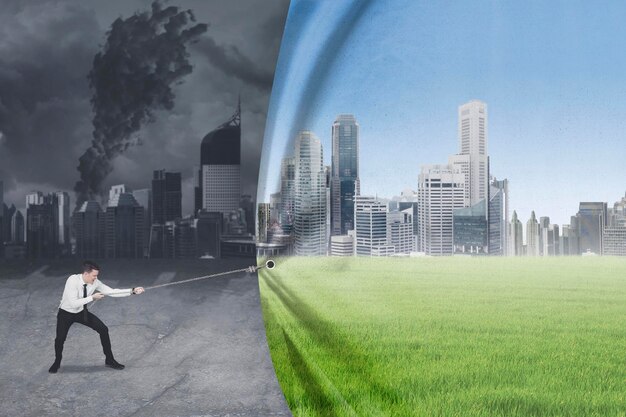
The climate crisis is one of the most pressing challenges humanity has ever faced. Rising global temperatures, extreme weather events, sea-level rise, and disruptions to ecosystems are just a few of the alarming consequences that affect our planet. While the problem may seem too vast and overwhelming for any one individual to solve, the truth is that small actions, when multiplied across millions or even billions of people, can lead to significant, positive changes.
In this article, we’ll explore how everyday actions — from adjusting your lifestyle to making more sustainable choices — can have a ripple effect, ultimately contributing to a healthier, more sustainable world.
1. Reducing Energy Consumption
One of the most impactful ways to fight the climate crisis is by reducing energy consumption. Whether it’s turning off lights when not in use, investing in energy-efficient appliances, or adjusting thermostats, small actions can collectively result in significant energy savings. For example, switching from incandescent light bulbs to energy-efficient LEDs can reduce a household’s electricity consumption by up to 75%.
More importantly, reducing energy consumption lowers the demand for energy production, which is largely dependent on burning fossil fuels. Fossil fuel combustion is a major contributor to greenhouse gas emissions. By using less energy, individuals help decrease the need for these harmful emissions.
2. Adopting Sustainable Transportation
Transportation is another key contributor to the climate crisis. Cars, planes, and ships all release carbon dioxide and other pollutants into the atmosphere. A small, but powerful change is shifting away from private vehicles to more sustainable modes of transport. Walking, cycling, using public transportation, or driving fuel-efficient or electric vehicles can drastically reduce your carbon footprint.
Even the decision to reduce air travel or carpool when possible can have a meaningful impact. According to studies, a round-trip flight from New York to London can release about 1.6 metric tons of CO2 per person. By minimizing air travel and opting for trains, buses, or other eco-friendly alternatives, you’re helping to reduce global emissions.
3. Mindful Consumption and Waste Reduction
The way we consume products plays a significant role in the climate crisis. From the manufacturing process to the disposal of goods, products have an environmental cost. Reducing waste by choosing reusable items, recycling, and buying only what you need can reduce the strain on landfills and cut down on the resources needed for manufacturing new goods.
Another crucial aspect is reducing food waste. According to the Food and Agriculture Organization, roughly one-third of the food produced globally is wasted, which contributes to greenhouse gas emissions. By planning meals, properly storing food, and composting organic waste, individuals can significantly reduce their environmental impact.
4. Supporting Sustainable Businesses
The choices we make as consumers have the power to influence the market. Supporting businesses and companies that prioritize sustainability, environmental conservation, and ethical sourcing helps create demand for more eco-friendly practices. By purchasing goods from companies that use renewable energy, minimize waste, or have sustainable supply chains, you send a message that sustainability matters.
Additionally, advocating for corporate responsibility through voting with your wallet or supporting green policies can amplify the impact of these small actions. Supporting renewable energy sources like solar or wind can accelerate the transition away from fossil fuels and create a more sustainable economy.
5. Planting Trees and Supporting Green Spaces
Trees and plants play an essential role in the environment. They act as carbon sinks, absorbing CO2 from the atmosphere and producing oxygen. Planting trees, supporting reforestation efforts, or simply taking care of local green spaces can make a big difference. Even small, community-based tree-planting initiatives can contribute to combating deforestation and climate change.
By supporting urban greening projects, we can reduce the heat island effect in cities, promote biodiversity, and create healthier environments for ourselves and future generations.
6. Educating and Raising Awareness
One of the most powerful tools we have in fighting the climate crisis is education. Spreading awareness about climate change and sustainable practices can inspire others to take action. When we make informed decisions about how we live, we encourage others to follow suit. Additionally, participating in community clean-ups, volunteering for environmental organizations, or attending climate-focused events helps to amplify the movement.
By actively engaging in dialogue and advocating for stronger policies at local, national, and global levels, individuals can help shape a future that prioritizes the health of the planet. Awareness is the first step toward collective action.
7. Advocating for Policy Change
While individual actions are important, they must be coupled with systemic change. This is where advocacy and political action come into play. Supporting politicians and organizations that prioritize climate action, voting for policies that reduce emissions, and pushing for green energy initiatives are essential in tackling the climate crisis at its root. Many small grassroots movements have successfully influenced policy changes, proving that when people unite for a common cause, their collective voice can be heard.
Conclusion: Every Action Counts
The climate crisis is an enormous challenge, but by no means is it insurmountable. Each small action, from reducing waste to advocating for policy change, plays a vital role in shaping a sustainable future. When multiplied across millions or billions of people, these efforts can lead to substantial global change.
While governments, corporations, and large institutions must also play their part, the individual’s contribution is just as important. Change begins with awareness and action — and every step, no matter how small, brings us closer to a world where the climate crisis is mitigated, and our planet’s future is secured.
It is time to realize that small actions do matter, and when combined, they have the potential to create the big changes needed to preserve our planet for future generations.
